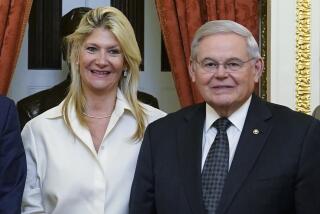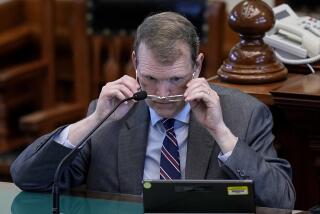Much More Than Sex in Packwood Case : Diaries underscore need for tougher ethics laws on lobbyists and campaign financing
- Share via
As he heads for an Oct. 1 exit after his scandal-driven resignation from the Senate, Bob Packwood (R-Ore.) is working to discredit the personal diaries that helped pave the way for his downfall. Among other things, Packwood now says--as he in some cases told the Ethics Committee when it was investigating allegations against him--that he wrote about meetings that never took place and reported statements that were never made. Supposedly among the latter is an eyebrow-lifting entry on March 6, 1992, involving Sen. Phil Gramm, who was then running the Republican Senate campaign committee and is now a candidate for the GOP presidential nomination.
Packwood describes a promise from his Texas colleague to move $100,000 in “soft” money--funds that by law can be used only for such things as get-out-the-vote drives--to Packwood’s personal reelection campaign. “What was said in that room would be enough to convict us all of something,” Packwood told his diary. Packwood now says this entry was “totally wrong,” and Gramm denies that any wrongdoing occurred.
Whatever the accuracy of this specific reference, the Ethics Committee found the great bulk of the entries it subpoenaed to be believable and, as its vote to seek Packwood’s ouster made clear, supportive of the allegations against him. Among other things, the diaries lend great weight to the charge that Packwood abused his official position by seeking a job for his former wife from parties he could help. His object was to ease his alimony burden.
Most intriguing and, as they affect the Senate, most disturbing are the diary entries describing in revealing detail his close relationship with lobbyists and influence peddlers.
For years Packwood was the senior Republican on the powerful Finance Committee, which writes tax legislation, including often little-noticed provisions that can mean huge savings for certain companies and industries. With last year’s GOP landslide he became chairman. The diaries describe approaches made to him by lobbyists and the mutual rewards that resulted from doing timely favors. They make clear the enormous value of having access to key congressional players like Packwood, and they underscore again the seemingly central role that money plays in the nation’s political process.
The Packwood diaries, leaving aside their lurid details about the senator’s social behavior, are yet another compelling argument for toughening the ethics laws that govern public officials and campaign financing. The end of the Packwood case doesn’t end the need for that argument to be made and made again, until meaningful results are achieved.
More to Read
Get the L.A. Times Politics newsletter
Deeply reported insights into legislation, politics and policy from Sacramento, Washington and beyond. In your inbox twice per week.
You may occasionally receive promotional content from the Los Angeles Times.










